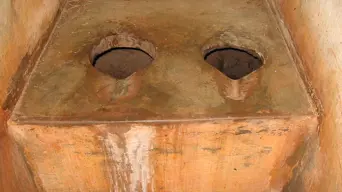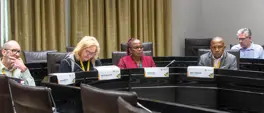MASECHABA NTSANE | A changing world, an unchanged injustice: Demanding innovation that delivers dignity and safe sanitation
Eyewitness News
21 November 2025 | 16:38World Toilet Day is a reminder that sanitation is not a luxury, but a basic human right, writes Masechaba Ntsane.

pit toilet
This year’s World Toilet Day theme is "Sanitation in a Changing World". Each year, Equal Education (EE) undertakes advocacy to highlight the significance of this day, particularly for learners in schools that still use plain pit toilets as a form of sanitation.
We speak about the dignity of learners as they use these unsafe and dangerous structures that have led to multiple injuries and taken several lives. It is appalling that 31 years into democracy and 12 years since the promulgation of Minimum Uniform Norms and Standards for Public School Infrastructure, which ban the use of these toilets, we still have to advocate, protest and litigate for the urgent removal of plain pit toilets in schools.
According to the United Nations, World Toilet Day, as observed every year in November, is meant to inspire action to tackle the global sanitation crisis. This year’s theme, "Sanitation in a Changing World," asks us to confront the uncomfortable truth: while the world is moving forward, our schools are being left behind.
World Toilet Day is a reminder that sanitation is not a uxury, but a basic human right.
Yet, in a changing world where technology advances rapidly and global conversations are shaped by innovation and environmental sustainability, our schools remain stuck with plain pit latrines, unsafe sanitation and unreliable water supply. In the midst of the Fourth Industrial Revolution (4IR) excitement, we seem to forget that learners have died and continue to be killed in pit toilets, as a result of the government’s failure, lack of urgency and neglect. Each day that pit toilets remain standing is a day that our leaders are actively denying learners their right to health, safety and education.
The campaign's origins trace back to 2017, when EE members—high school learners known as Equalisers—in Ga-Mashashane within Limpopo’s Capricorn district began agitating for safe toilets and reliable water access, followed by the then MEC (Mr Ishmael Kgetjepe) of Education in the province’s address that there are no schools in Limpopo without water and sanitation.
Their bravery in raising larm against unsafe sanitation infrastructure laid bare the gap between government promises and lived reality. These learners exposed how many schools still relied on illegal pit toilets, despite the national school infrastructure law that banned such facilities by 2013 and demanded their replacement by 2016.
Even as the government rolled out some sanitation projects—the 2015 sod-turning event launched new sanitation facilities in more schools—the pace remained slow and inconsistent. More recent reports show that in many schools, sanitation conditions remained unchanged or worsened. The Limpopo Department of Basic Education has repeatedly been called out for failing to fulfil its legal and moral obligations to provide safe school infrastructure.
As a result of these delays, the new infrastructure that many schools received could not be allocated funds for maintenance.
Neglecting maintenance of existing Water, Sanitation and Hygiene (WASH) infrastructure in schools not only leads to its inevitable deterioration and costly replacement but also ndermines the very foundation of learners’ safety and dignity. This cycle is intensified by climate change, which exacerbates risks such as flooding, drought and extreme weather events, causing damage to infrastructure and contributing to unreliability.
As we push forward the conversations on environmental sustainability and the 4IR, we must recognise that investing in and maintaining WASH facilities is essential. Without safeguarding these basic rights and infrastructure, efforts towards sustainable development and technological advancement risk being superficial, leaving vulnerable learners exposed to health hazards, inequalities and fatalities.
It is essential to recognise that the world is constantly evolving and we are continually confronted with new and innovative ideas to enhance development and to improve people’s lives.
At the same time, the need for toilets still remains an unchangedbasic human need for the safeguarding of human rights, such as the right to dignity and sanitation. Prioritising innovation that does not contribute to resolving the challenges in meeting the basic needs of marginalised learners and school communities, in a reality riddled by austerity, only exacerbates inequality. In a context like South Africa, there is a clear need for technological advancements to address the most basic needs of school communities.
If 4IR is prioritised, innovation should focus on providing good-quality and climate change-resilient WASH facilities in rural school communities. However, this remains an unfulfilled agenda item, leaving schools in these communities behind and constantly struggling to maintain their already limited resources and infrastructure.
While quintile 5 schools are able to choose between robotics and engineering graphics and design, quintiles 1, 2 and 3 schools must continue to make the painful trade-off between safeguarding livelihoods (by addressing challenges broughtabout by budget cuts, such as teacher cuts) and providing a safe teaching and learning environment by eradicating plain pits.
The hope for Limpopo’s learners is that no child should lose their dignity or life to sanitation failures. The struggle continues, but so does the resolve of EE and the voices of learners demanding safe, accessible water and sanitation in every school, especially amidst a changing world. EE firmly calls for an immediate end to education infrastructure budget cuts that undermine the provision and upkeep of essential school sanitation facilities.
The urgent eradication of plain pits is not negotiable - it is a matter of health, dignity and education rights. Maintaining existing infrastructure is equally critical to prevent a costly cycle of decay and replacement.
If the government truly aims to innovate, it must harness the power of the 4IR to revolutionise sanitation in schools, aligning with this year’ Toilet Day theme. Innovation should prioritise sustainable, smart solutions that are responsive to the needs of those who are most vulnerable, ensuring safe, hygienic, and dignified learning environments for every child.
Authored by Masechaba Ntsane, National Organising Junior Organiser & Kimberley Khumalo, Researcher.
Get the whole picture 💡
Take a look at the topic timeline for all related articles.
















